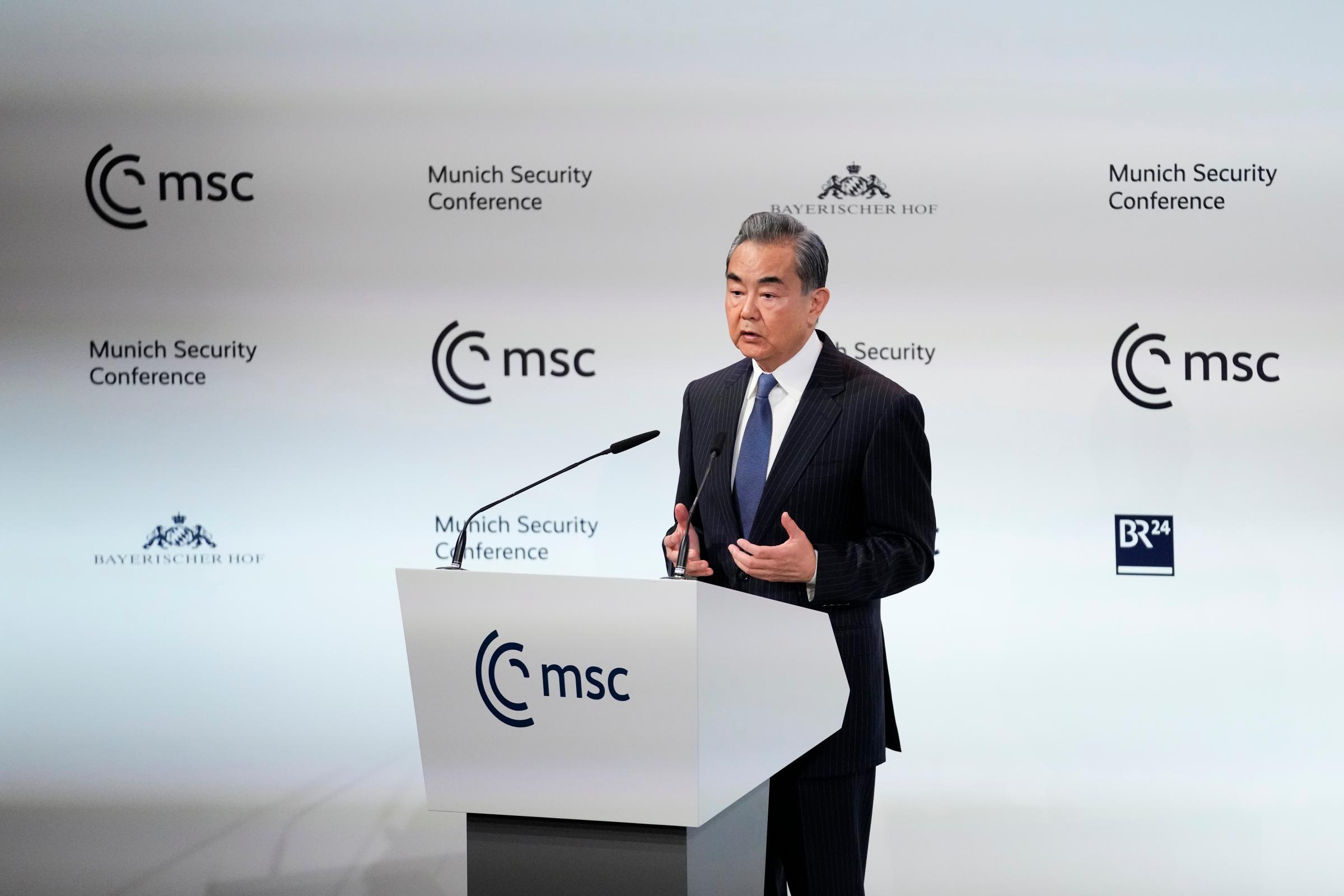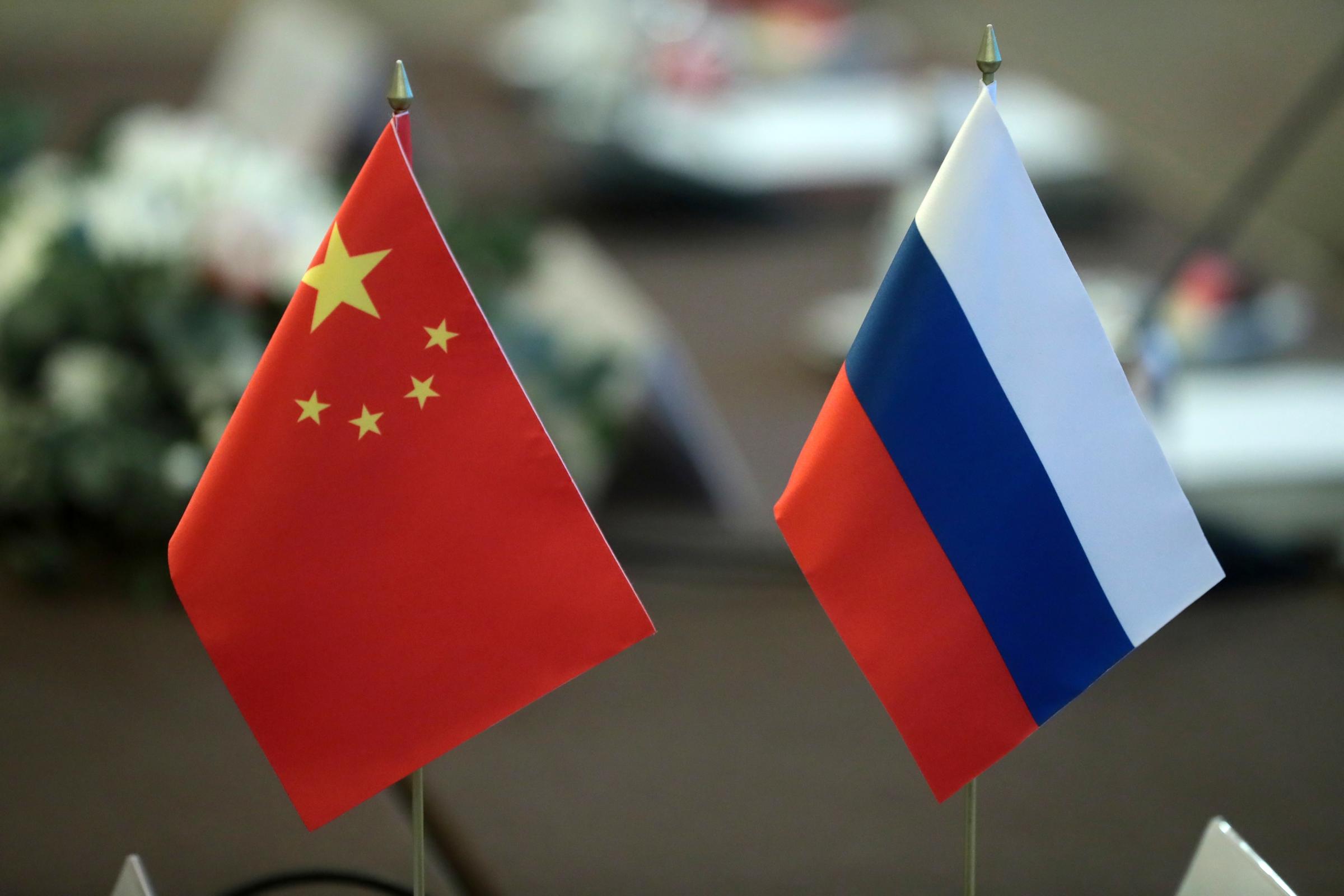It may have taken almost a year of bloodshed, but today China sees the war in Ukraine as a big problem—and wants to play a significant role in bringing it to a close. That was the message that Beijing’s top diplomat, Wang Yi, delivered to European leaders at the Munich Security Conference on Saturday. “This warfare must not continue,” he said.
The trouble is, of course, that Wang wasn’t suggesting taking the shortest distance between two points, which would be Beijing halting its financial and political support for Vladimir Putin’s war machine. Instead, he ventured a nebulous peace plan that China would broker between the warring parties, while aiming a gossamer-veiled rebuke at the U.S.
“Some forces might not want to see peace talks materialize,” Wang said. “They don’t care about the life and death of Ukrainians, nor the harm on Europe. They might have strategic goals larger than Ukraine itself.”

Point-scoring aside, China’s peace initiative is a bold gambit that raises many questions. Firstly, why now? China has historically been chary about meddling in faraway conflicts. And its forays in Korea in the 1950s and Vietnam in the 1970s came at a high cost. Engaging in the Ukraine conflict now may merely stem from a desire to stay relevant. “It could be just as simple as not wanting to be left out, saying, ‘Hey, we’re involved, we’re big boys, too,’” says Robert Hunter, a former U.S. Ambassador to NATO. “But we won’t know more until they put some meat on the bones.”
Of course, there could be another driver: the fact that Russia is losing. From China’s perspective, a swift Putin victory would have been a slap in the face for the U.S. while underscoring the impotence of the West. But the protracted conflict has galvanized the E.U. and reenergized NATO. The longer the fighting rumbles on, the greater chance there is that Russia will be unable to hold its seized territory, portending a waning sphere of influence across Central Asia. “A political vacuum along China’s northern border would be a very grave security threat” for Beijing, says Victor Shih, an expert in Chinese politics at the University of California, San Diego.
But a bigger query hangs over whether China has the diplomatic chops to deliver a resolution palatable to both sides. True, over the last 20 years China has upped its contributions to international humanitarian efforts and today is the largest contributor to U.N. peacekeepers amongst Security Council members. But Beijing has precious little experience brokering peace deals, and its motives as Russia’s main strategic partner—one which has benefited from the war through access to cut-price Russian natural resources—are extremely suspect.
“China is not a neutral peace broker,” says Jonathan Sullivan, director of China programs at the Asia Research Institute of U.K.’s Nottingham University. “It does not appear to have the credentials to pull this off.”
Although Ukrainian Foreign Minister Dmytro Kuleba cautiously welcomed Wang’s plan, President Volodymyr Zelensky has repeatedly ruled out a settlement that gives up any territory, rendering it unclear what any compromise might look like. Victor Gao, director of the China National Association of International Studies and an informal Chinese government spokesman, says that a likely starting point would be an armistice along current battlelines. It would mean “shelving the disputes for future generations to resolve,” says Gao. “And meanwhile, Ukraine will devote itself to peace and development and growth.”
As for Russia, China certainly has considerable influence it can wield. As Western countries have severed connections with Moscow, China’s trade with Russia hit a record high level of $190 billion in 2022—a 30% year-on-year rise. China’s purchases of Liquid Petroleum Gas, alone, have doubled over the past year. Wang arrived in Moscow on Tuesday and it remains to be seen how his peace initiative is received by Putin, or how much pressure China is prepared to exert to make it a success.

Certainly, Western skepticism is palpable. “We need more proof that China isn’t working with Russia, and we aren’t seeing that now,” European Commission President Ursula Von der Leyen told CNN on Saturday. U.S. Secretary of State Antony Blinken, meanwhile, hit back that China might be preparing to provide weapons to Russia, warning of “serious consequences” if it did.
For sure, a major sticking point looks like China’s incompatible position with Western perspectives: refusing to condemn Putin’s invasion and parroting Russian justifications about threats to its sovereignty. “This war is not just between Russia and Ukraine,” says Gao. “It is, in essence, a war between Russia on the one hand, and the United States and NATO, using Ukraine as a proxy.”
Of course, another motivation for Beijing may be to drive a wedge between Kyiv and its Western allies. As the war drags on, how to keep funding Ukraine’s fight will become an increasingly divisive issue for the U.S. and Europe. Wang’s peacebuilding rhetoric also provides a potential smokescreen for Chinese support for Russia—and room for Beijing to recast itself as the “responsible stakeholder” as the U.S ramps up supplies of weaponry. On Tuesday, China’s Foreign Minister Qin Gang urged “relevant countries to immediately stop adding fuel to the fire.”
The context of Qin’s remarks are also notable. The former Chinese Ambassador to the U.S. was speaking at the unveiling of a concept paper on Beijing’s plans for a new global security initiative, which, it says, would resolve disputes through dialogue and consultation and “advocate a concept of common security, respecting and safeguarding the security of every country.” Tellingly, the paper explicitly rejected the use of sanctions and backed the participation of multilateral institutions over which Beijing has considerable influence—such as ASEAN, the Africa Union, and the Arab League—while snubbing the E.U. and NATO.
It demonstrates that Beijing’s audience is increasingly the so-called Global South, which—while by no means a monolith—has recently surprised Western ears with its tepid backing of Ukraine’s position. A 15-country survey by the European Council on Foreign Relations think tank published Wednesday revealed a widening gulf in attitudes to the war, democracy and the global balance of power between the West and the developing world. “I am struck by how we have lost the trust of the Global South,” French President Emmanuel Macron told the Munich conference.
By focusing on “peace and dialogue,” fuzzy as it may sound, China can take the moral high ground over the U.S. in its engagement with the developing world. And by shifting the narrative from war-backer to peace-broker, Beijing scores a victory of influence whether or not its truce proposal ever gets off the ground. “China’s peace talk idea might be rejected out of hand by the West,” says Sullivan. “But it is sure to resonate in the developing world, much of which is suffering due to indirect fallout from the war in terms of their own food and energy security.”
More Must-Reads from TIME
- Cybersecurity Experts Are Sounding the Alarm on DOGE
- Meet the 2025 Women of the Year
- The Harsh Truth About Disability Inclusion
- Why Do More Young Adults Have Cancer?
- Colman Domingo Leads With Radical Love
- How to Get Better at Doing Things Alone
- Michelle Zauner Stares Down the Darkness
Write to Charlie Campbell / Singapore at charlie.campbell@time.com